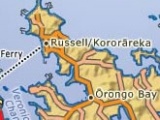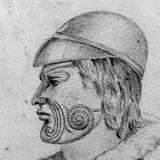Events In History
-
 11 March 1845The fall of Kororāreka
11 March 1845The fall of KororārekaAfter about 500 Ngāpuhi warriors led by Kawiti and Hōne Heke attacked Kororāreka, its inhabitants were evacuated to the ships Victoria and Active. For the fourth and last time, the flagstaff on Maiki Hill was cut down. Read more...
-
 19 January 1845Hōne Heke cuts down the British flagstaff - again
19 January 1845Hōne Heke cuts down the British flagstaff - againInitially supportive of the Treaty of Waitangi, Hōne Heke became increasingly disenchanted with the effects of European colonisation. This was his third attack on the flagstaff at Kororāreka (Russell). Read more...
-
 30 December 1835Charles Darwin leaves NZ after nine-day visit
30 December 1835Charles Darwin leaves NZ after nine-day visitDarwin's visit to the Bay of Islands on HMS Beagle was brief and unspectacular from his point of view. The Beagle's captain, Robert FitzRoy, would later serve as the second governor of New Zealand. Read more...
-
 5 March 1830Outbreak of the Girls' War at Kororāreka
5 March 1830Outbreak of the Girls' War at KororārekaUruroa, the brother-in-law of Hongi Hika, responded to a rival who had cursed him and his Ngāi Tawake people after a fight between young women on the beach at Kororāreka. Many were killed in the conflict that followed. Read more...
 Hōne Heke
Hōne Heke
Ngāpuhi chief Hōne Heke was an influential northern Māori voice in favour of the Treaty of Waitangi. However, he later became a leading opponent of British rule in New Zealand.
Read more...Articles
The Northern War

The Northern War, fought in the Bay of Islands in 1845-46, was the first serious challenge to the Crown in the years after the Treaty of Waitangi. Its opening shots marked the beginning of the wider North Island conflicts that are often referred to as the New Zealand Wars.
-
Page 2 – Origins of the Northern War
Actions by the colonial government cost Māori in the Bay of Islands in terms of lost trade and opportunities. Heke feared that chiefly authority was now subservient to that of
-
Page 3 – The sacking of Kororāreka
The sacking of Kororāreka shook the settler population. Over £50,000 worth of property was lost. In Auckland panic set in. Some settlers sold their land for whatever price they
Capital 150

Ever since 1865, Wellington’s identity has been inextricably linked to its role as the seat of central government.
- Page 1 - Capital 150Ever since 1865, Wellington’s identity has been inextricably linked to its role as the seat of central
A frontier of chaos?

In the years before the signing of the Treaty of Waitangi, relations between Māori and Europeans were marred by a number of high-profile incidents.
-
Page 7 – Kororāreka
The missionaries divided the Europeans who came to New Zealand in the early 19th century into two groups: the agents of virtue (themselves) and the agents of vice (almost
New Zealand's 19th-century wars

War changed the face of New Zealand in the 19th century. Tens of thousands of Māori died in the intertribal Musket Wars from the 1810s to the 1830s. There were fewer deaths during the New Zealand Wars (1840s-1870s) between Māori and the Crown, but the consequences were still dire for many tribes.
- Page 2 - Pre-1860 conflictsThe Musket Wars of the 1810s-1830s caused thousands of Māori to flee their traditional lands, freeing large areas for Pākehā (European) settlement. In 1840, Europeans bought
Related keywords
- wellington city
- missionaries
- russell
- hone heke
- northern war
- roadside stories
- new zealand wars
- treaty of waitangi
- te ruki kawiti
- tamati waka nene
- samuel marsden
- ngapuhi
- charles darwin
- pre-1840 contact
- bay of islands
- NZ Wars memorial
- paihia
- ruapekapeka attack
- kupapa
- hms hazard
- 1840s
- musket wars
- sealers
- maori-pakeha
- whaling
- european discovery
- painting
- augustus earle
- prostitution
- hongi hika
- flags
- henry williams
- treaty signatories
- te reo māori









